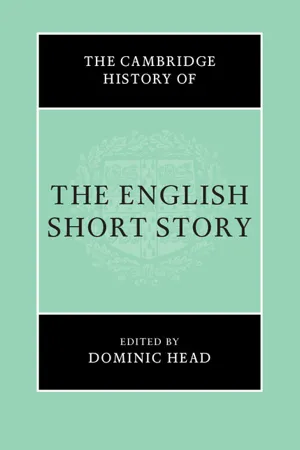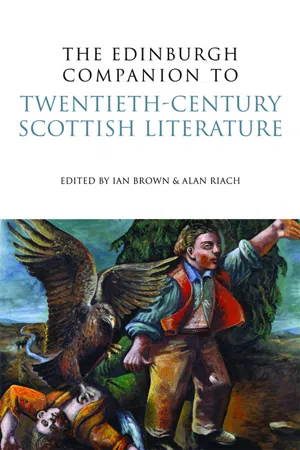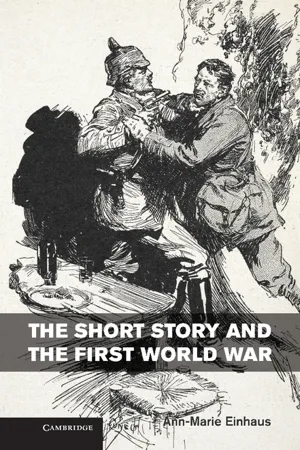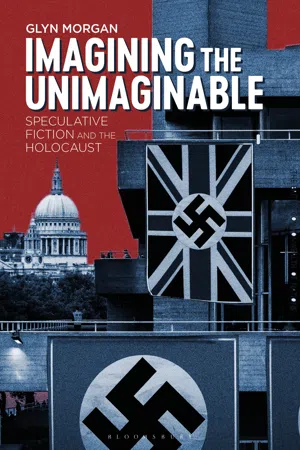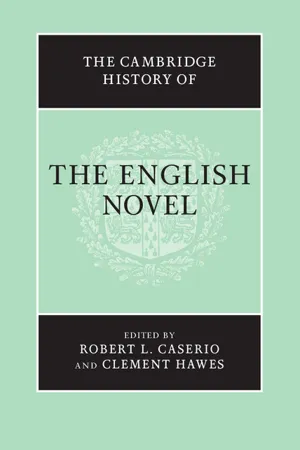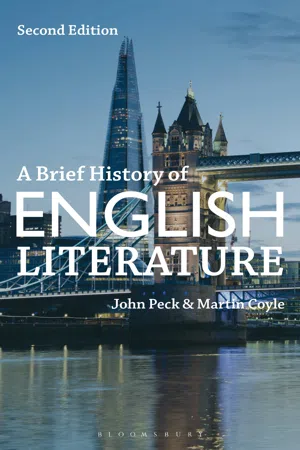Literature
Second World War Fiction
Second World War fiction refers to literature that is set during or inspired by the events of World War II. This genre often explores the impact of the war on individuals, families, and societies, and may encompass a wide range of themes such as heroism, sacrifice, resilience, and the human cost of conflict. Authors use this backdrop to delve into the complexities of human experience during wartime.
Written by Perlego with AI-assistance
Related key terms
1 of 5
8 Key excerpts on "Second World War Fiction"
- Dominic Head(Author)
- 2016(Publication Date)
- Cambridge University Press(Publisher)
One distinction, however, is broadly useful: responses to the two world wars in British short fiction are roughly split between short prose that is about the war and its effects, and stories that incorporate the war into other, often pre-existing narra- tive or aesthetic concerns. Either kind of war story contributes to one of the most important social functions of literature, namely the enabling of readers to employ fictional narrative frameworks against which to ‘read’ their own experience of war. As Elizabeth Bowen observed in 1945 in the preface to her collection The Demon Lover and Other Stories, stories could fulfil the same crucial function of coping with traumatic experience as material objects: People whose homes had been blown up went to infinite lengths to assemble bits of themselves – broken ornaments, odd shoes, torn scraps of the curtains that had hung in a room – from the wreckage. In the same way, they assembled and checked themselves from stories and poems, from their memories, from one another’s talk. 8 Stories that incorporate the war can range from a magazine romance tale in which the heroine happens to be a munitionette to modernist sketches such as Virginia Woolf’s ‘The Mark on the Wall’, in which the war for the most part appears in the background, fleetingly visible behind the narrator’s stream-of-consciousness until it is interrupted by another character’s obser- vation, at the close of the story, that ‘it’s no good buying newspapers . . . Nothing ever happens. Curse this war; God damn this war!’ 9 Stories that address the war specifically also do so in a wide variety of ways, from scrutiny of the conduct of war in particular locations or service branches – as in Mary War Stories: The Short Story in the First and Second World Wars 153 Borden’s nursing sketches in The Forbidden Zone – to its psychological con- sequences, such as Katherine Mansfield’s exploration of grief in ‘The Fly’.- P. Crosthwaite(Author)
- 2009(Publication Date)
- Palgrave Macmillan(Publisher)
Though the legacy of these escalations in the nature of warfare is a pervasive, mistakenly neglected, dynamic in literary culture, this leg- acy receives its most nuanced registration not at the readily surveyable levels of plot and theme, but rather in the minutiae of textual, and particularly formal, detail. Hence my selective approach, which rests on the wager that what a close analysis of a small group of texts may sacrifice in comprehensiveness will be more than compensated for in critical insight. It is important, though, that the texts I discuss in detail be located within a wider literary milieu, and to that end I will sketch a brief history of ‘advanced’ or ‘experimental’ fictional responses to the Second World War. 1 As Lyndsey Stonebridge notes, during the war and in its immedi- ate aftermath ‘a handful of British writers [risked] an encounter with the limits of the novel form’ . 2 The most notable works include Henry Green’s Caught (1943), Patrick Hamilton’s Slaves of Solitude (1947), Virginia Woolf’s Between the Acts (1941), and Elizabeth Bowen’s two col- lections of short stories, Look at all Those Roses (1941) and The Demon Lover (1945), and novel, r The Heat of the Day (1948). Central to this clus- y ter of texts is a sense that the experience of war pressures the division between private and public, self and other. Adam Piette has identified an ‘invasion’ of the private imagination by war as the characteristic 4 Trauma, Postmodernism, and World War II preoccupation of the fiction of the period. 3 As Stonebridge suggests, however, and as I try to show through a reading of Woolf’s Between the Acts in Chapter 4, the definitive experience of the ‘imagination at war’, at least from a psychoanalytic perspective, would rather appear to be the ‘roughing’ or even ‘explosion’ of the very distinction between pri- vate and public, so that both categories ‘are called into question’ .- Ian Brown, Alan Riach, Ian Brown, Alan Riach(Authors)
- 2009(Publication Date)
- EUP(Publisher)
88 CHAPTER SEVEN Literature and World War Two Douglas Gifford There is an immense – and continuing – body of writing that records, laments and occasionally celebrates World War Two’s impact on individuals and communities. This chapter can consider only some of Scottish writers’ most vivid and poignant commentaries in poetry, fiction and drama, bearing witness to those effects. It explores major Scottish writers who foresaw, fought and remembered the war. Its texts express the damaged, disrespectful, myth-making, yet impressively enduring nature of Scottish writing within and about the 1939–45 British conflict. It also considers home responses for those bombed, evacuated, objecting conscientiously, or seeing their fami-lies permanently blighted. War literature arguably falls into two groupings: that directly affected, produced in the post-war quarter-century; and later secondary re-imagining. War’s long shadow lingers in contemporary works like Andrew Greig’s (1951–) That Summer (2000) and Alison Kennedy’s (1965–) Day (2007). Fiction War is never far from Eric Linklater’s (1899–1974) fiction, whether as background and reminiscence for the picaresque hero of Magnus Merriman (1934) or later centring on it. Private Angelo (1946), dedicated to the Eighth Army is surely, however, pre-eminent in Scotland’s war fiction, its savage satire on war and profound empathy with humble predicaments and suffer-ing setting it alongside the great war novels of Hašek, Vonnegut and Heller. Americans and British are liberating Italy, although, as the peasant Angelo wryly comments, liberation by bombing villages is somewhat confusing. A cast of fanatics, collaborators, devious aristocrats, bullying Nazis and prof-iteers rampage through Italy. Like Voltaire’s Candide , the narrator’s voice is of a kindly simple storyteller, understating events’ actual horror.- eBook - PDF
- Marina MacKay(Author)
- 2017(Publication Date)
- Bloomsbury Academic(Publisher)
What about noncombatant writers? In what ways, and to what effect, does their writing in the 1940s respond to the “secondness” of the Second World War? I suggest in this chapter that mod-ernism itself was also self-consciously resurrected in the Second World War. In a sense, this should not be particularly surprising given how many major modernists of the 1910s and 1920s were still producing major poetry and prose, although for institutional reasons—some quite simple, to do with how and what we teach, and why—their later work lacks the straightforward canonicity of their 1920s writing. However, there is another way in which critics have seen the literature of the Second World War as a lit-erature of recurrence, because so much of it explicitly recalls the traumas of the First World War and its aftermath. High modern-ist images of broken minds in broken cities take on a retroactively prophetic quality in the 1940s when the long-anticipated bomb-ers arrive. Thoughts on modernism in 1940 Reflections on the meanings of the First World War were common-place in the literature of the late 1930s. By now it had become MODERNISM, WAR, AND VIOLENCE 106 106 obvious that a new war was virtually inevitable, even in the face of antiwar efforts ranging from popular pacifist movements such as the Peace Pledge Union to the broad acceptance of the gov-ernment’s policy of appeasement. Outside of the literary, this late 1930s interest in the relationship between the First World War and the prospect of another showdown with Germany found expres-sion in a whole range of media in these closing years of the tenu-ous peace. In The Truth about the Peace Treaties , serialized in the Conservative-leaning Daily Telegraph early in 1938, former prime minister David Lloyd George tried to defend himself from what had already become a historical truism that the coming war was a result of Versailles’s supposedly Carthaginian peace. - eBook - PDF
- Ann-Marie Einhaus(Author)
- 2013(Publication Date)
- Cambridge University Press(Publisher)
Characteristics associated with the literature of high modernism, such as fragmentation of narrative structure, an interest in psychology and the dynamics of human interaction and the mind, undoubtedly all lend them- selves to the purpose of representing modern experience. Hynes goes as far as saying that the First World War and its sense of radical discontinu- ity ‘entered post-war consciousness as a truth about the modern world’, 71 including post-war literature, and links the myth-making war books of the late 1920s directly to literary modernism in that they ‘share a sense of history’. 72 A broad range of authors wrote about their war experiences using nar- rative or poetic techniques associated with modernism, often in the short form, 73 and their writing is felt to express most poignantly the experience of modern warfare. It is often conveniently forgotten, however, that modern- ist experimental writing about the war crucially depended on a departure from existing models of expression. A vast array of non-modernist war fiction published during and after the war created the literary context – the ‘horizon of expectations’ – that helped contemporary and modern readers situate modernist responses to the conflict as a commentary on or counterpoint to these established models. Without the continued exis- tence of alternative models of expression against which to offset innova- tive approaches to rendering the experience of war, modernist war writing would lose much of its edge. At the same time, there is much overlap and not always a clear dividing line between the different ‘schools’ or trends in war writing. In fact, as we will see below, modernist, realist and popular writers frequently addressed very similar topics, and writers commonly regarded as modernists do not necessarily always provide the most radical literary rendering of cultural concerns. - eBook - ePub
Imagining the Unimaginable
Speculative Fiction and the Holocaust
- Glyn Morgan(Author)
- 2020(Publication Date)
- Bloomsbury Academic(Publisher)
Introduction: Fictionalizing the HolocaustThis book developed from my dual interests in representations of atrocity and trauma, and the manner in which alternate history manipulates historical narrative. In particular, over the course of my research it soon became evident that the critical dialogue surrounding the Holocaust, and its representation in fiction and art, provide a unique friction against the limitless possibilities of science fiction, fantasy and alternate history – genres which we can group, however loosely, under the label speculative fiction (SF). Yet the fictional texts which occupy this niche have received an uneven critical reception, with a few high-profile texts overshadowing what is in fact a broad selection dating back to the Second World War and continuing to attract new fictions today, ranging from science fiction pulp to literary fiction via bestselling popular thrillers.The Holocaust occupies a unique position in Western cultural thought: there is no other event in the common history of humanity which is so heavily studied and written about and simultaneously coded as uninterpretable and unapproachable. Nonetheless, attempts to interpret, approach and understand are legion, not least through the medium of fiction. It could be that these texts persist as an artistic development of Freud’s concept of durcharbeiten , or ‘working through’, an expression of Anglo-American readers’ continued fascination with not only the Second World War and the Nazis, but with the greatest crime of that conflict.Yet, the sheer weight of numbers removes none of the problems or controversies surrounding representation. Many representations of the Holocaust in fiction draw upon the implicit assumption that its traumatic experience cannot, and perhaps should not, be conveyed through art. This is a situation perhaps true of other traumatic and significant events both personal and societal, but in this as in many other things the Holocaust supersedes them. For example, in an influential and relatively early survey of the field of Holocaust literature, Alvin H. Rosenfeld wrote that the Holocaust ‘occupies another sphere of study’ compared to other topical literatures about ‘the family, of slavery, of the environment, of World War I or World War II’, continuing that Holocaust literature ‘force[s] us to contemplate what may be fundamental changes in our modes of perception and expression’.1 - eBook - PDF
- Robert L. Caserio, Clement Hawes(Authors)
- 2012(Publication Date)
- Cambridge University Press(Publisher)
The Second World War also would see the publication of a number of important late modernist novels, of which the most widely read is likely Woolf’s final work, Between the Acts (1941). The novel is set three months before the outbreak of war, in the grounds of a country house where a pageant of English literary history is being staged, and, in marked contrast to the sense of alienation marking Woolf’s earlier treatments of the national culture, here is an England newly dear because newly endangered by the planes overhead (“And what’s the channel . . . if they mean to invade us?”). 20 The unnamed village in which the novel takes place stands for England itself – characters’ names go back to the Domesday Book, to the last invasion of “England” a millennium earlier – though the novel’s universalizing impulses are unmistak- able. A shower of rain arrives in the final “present day” scene of the pageant, and is no longer simply rain but “all the people in the world weeping . . . all people’s tears, weeping for all people” (122). National allegory such as Woolf deploys is one of the dominant modes of anti-realism in Second World War writing, but, rather surprisingly, it produces some of the war’s most politically ambiguous fiction. Rex Warner’s stunning The Aerodrome (1941) describes the steady takeover and occupation of an English village by the airbase on its outskirts, and the encroaching evil of the airbase seems to stand at once for continental-style fascism and, seditiously enough, for the British government in this time of total war, after the Emergency Powers (Defence) Act of 1940 put citizens and their property at the disposal of the state. Storm Jameson’s The Fort (1941) is set in the spring of 1940, as France fell to the Germans, in a cellar in northern France, and its characters are a mixed group of English, French, and German soldiers, some of them young men and others veterans of the last war. - eBook - PDF
- John Peck, Martin Coyle(Authors)
- 2017(Publication Date)
- Bloomsbury Academic(Publisher)
But a literary text can often convey the deeper currents of change and concern within a society; even unknowingly, a literary text can touch on the issue behind the surface issue, the story behind the story. We can start to appreciate the truth of this proposition if, initially, we consider the literature of the Second World War and texts that look back to this war. The point has often been made that the Second World War did not lead to the production of the great, if painful, poetry that we associate with the First World War. But this is under-standable; there was not the same sense of an apocalypse, of being at the end of everything. What we tend to witness, in the poetry of Keith Douglas, Alun Lewis and Charles Causley, for example, is a sense of individuals caught up in events that they can neither comprehend nor control; more often than not, they are decent people in a world that has become indifferent to decency. There is something of this in the increasingly highly regarded wartime fiction of the Anglo-Irish novelist Elizabeth Bowen. The Heat of the Day (1949) concerns a sus-pected pro-German traitor, Robert Kelway, and his relationship with a divorcee, Stella Rodney, in wartime London. Stella is told about Robert’s apparent crimes, but refuses to believe her informant. Stella’s son, Roderick, inherits an estate in Ireland, and then discovers the uncomfortable truth about his parents’ divorce. Another strand in the novel involves Louie Lewis, a young woman whose adulterous relationship results in the birth of a child. What the novel conveys is a sense of emotional dislocation. In a time of war, old points of reference, old values and old convictions have gone. Readers today might be interested in the wartime setting 266 A Brief History of English Literature of The Heat of the Day , but are likely to become more caught up in the lives of emotionally vulnerable and exposed characters.
Index pages curate the most relevant extracts from our library of academic textbooks. They’ve been created using an in-house natural language model (NLM), each adding context and meaning to key research topics.
